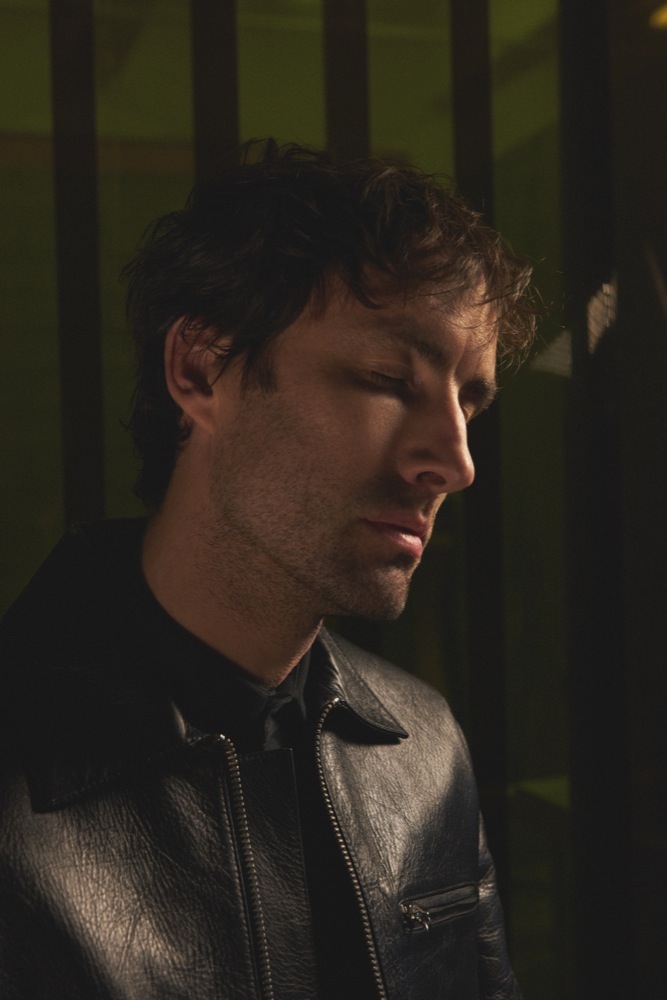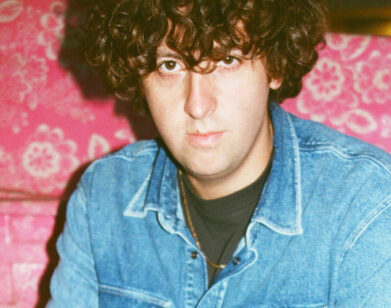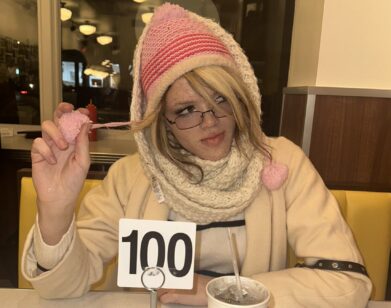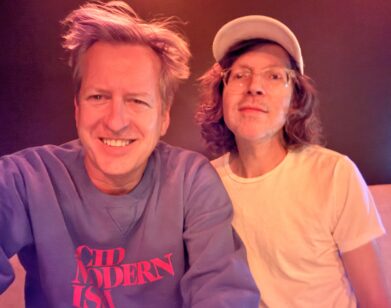Andrew Bird
ANDREW BIRD IN NEW YORK, MARCH 2016. PHOTOS: HANS NEUMANN. STYLING: CHLOE HARTSTEIN. GROOMING: LAURA DE LEON FOR ORIBE HAIR CARE AT JOE MANAGEMENT.
When Interview last spoke with Andrew Bird, it was in 2012, just after the release of his 10th studio album, Break It Yourself. Today, the multi-instrumentalist, singer, songwriter, and composer releases his 13th, Are You Serious?, recorded with producer Tony Berg and featuring Fiona Apple, Blake Mills, and others. Through the title, Bird admits that he pokes fun at himself, as the album marks a shift in his artistic approach. Compared to previous releases, on which he frequently relied on lyrical obscurity, Bird employs a deeper, more direct and emotional vein of writing on Are You Serious?. Rather than escaping into another realm and continuously layering metaphors, he explicitly addresses the struggles he, his wife Katherine Tsina, and their now four-year-old son Sam, have faced in the last three years: Tsnia was diagnosed with cancer; they were kicked out of their New York apartment; and after the introduction of Obamacare, the family relocated to Los Angeles.
Now 42, Bird began his career with the Squirrel Nut Zippers in the early ’90s and began releasing solo material in 1996. In addition to violin, his primary instrument, the Illinois-native is also proficient on the guitar, mandolin, xylophone, and glockenspiel—not to mention his profound knack for whistling. He wrote the track “Whistling Caruso” for The Muppets, and also composed the original score for the FX series Baskets. Just before the release of his album, and the day after the heartbreaking attacks in Brussels, Bird spoke over the phone with his longtime friend—and neighbor—Devendra Banhart.
DEVENDRA BANHART: Hey, Andrew! How’re you doing?
ANDREW BIRD: I’m alright. And yourself?
BANHART: Let’s talk for a couple of hours and then begin the interview. Let me ask all the important questions and then we can start recording… So rock ‘n’ roll. What’s it all about?
BIRD: The Holy Spirit. [laughs]
BANHART: Oh, shit. Good answer.
BIRD: Let’s clear something up, though: Your middle name. Was that just an icebreaker when you said your middle name was OB1?
BANHART: Well, it might have served the purpose of breaking the ice, but it wasn’t a tough sell.
BIRD: Was it fabricated as an icebreaker?
BANHART: It was fabricated by my parents in 1981 while they watched that documentary, something about a Star and a War… I might as well mention, to the readers out there, that Andrew and I don’t refer to each other by our first names. I call you by your middle name which—I’m going go ahead and share your middle name—is Wegman. That’s how I refer to Andrew, who’s actually my neighbor. It’s weird that we’re doing this over the phone because I could have come over and stolen some of your avocados.
BIRD: I know, but we were forced apart.
BANHART: So, where does Wegman come from?
BIRD: From Iowa, my mother’s side, it’s a last name. I think it means “bridge keeper,” like bridge keeper of a medieval castle. The guy who attended the draw bridge over the moat. I don’t know if that symbolism really works on me or not…
BANHART: I often think of you as somebody who loiters around bridges. A lot of people don’t this, but if they watch that Red Hot Chili Peppers video, “Under the Bridge,” and look closely there’s a pre-teen Wegman Bird in the corner. [laughs]
BIRD: I was hoping the Chili Peppers would make it into this talk.
BANHART: So moving on… It’s hard to talk about much without mentioning what’s happening in the world and what happened yesterday, the horrifying attacks that have happened in Brussels. My cousin lives there. I was really horrified generally, but also it was a very personal fear.
BIRD: I was just there two weeks ago, passing through. I’ve spent a lot of time in Brussels and my friend was there.
BANHART: I really don’t know what to say about it. I’m in shock and I feel like I’m not going to do this interview in a non-shocked, horrified, and mourning way. It would be good to mention that I’m in mourning right now, and shaken up. Let’s take a moment to send prayers to the families of the victims, and send love and support and hope. The unifying thing is love—not a common enemy, but a common love. [pauses] Um, so, now let’s talk about the record. Why is this record called Are You Serious?
BIRD: It’s been the working title over the last four or five records. When I start, before I name the record, I send the mixes to my manager and say, “Call it Are You Serious.” It’s a bit of a running joke between us, kind of like, “Are you serious? This is what you labored over?”
But also, I’ve been doing a lot of shows where I follow a comedian, and I’ve been on tour with comedians. Comedians can be quite personal and professional, but there’s an inherent irreverence to it, even if they’re divulging very personal things. Everyone’s laughing and then I come on—me with my heartfelt song, my feelings expressed through song. I kind of like the way it makes me feel ridiculous. I’ve always had levity in my songs, so I like to turn things over, twist them around, and make fun of myself. I feel an affinity with comedians, yet I follow a comedian and I’m like, “Who the hell am I, with my private little songs?” So the title is poking fun at myself. I’ve never found myself a confessional artist from that school of “here’s my pain and experiences wrapped up in a song,” yet here I am with a record that is like that.
BANHART: Yeah, this might be the first record that is “confessional,” but confessional is a horrible word. It implies that you’ve done awful things and now you’re confessing. [Your album] is just infinite, open, and vulnerable. That’s real communication. Maybe this is the least metaphoric or cryptic, maybe the most direct.
BIRD: I think it clarifies that I feel different. I didn’t get into this songwriting thing to get the girl, or to write about the girl, or to write about the break-up. Yet I’ve written, for the first time, clearly about these things. It’s most likely because I found the girl—obviously that’s why. Also starting a family, everything’s very real and visceral, not very cerebral. So it makes sense that you lose some patience for your own tendencies to get abstract and turn things over in your head. I used to say, “I’m writing to entertain myself,” that leads to word paly and jokes in song, but I lost some patience for that, given what was going on.
BANHART: I feel like it’s navigating a spectrum. At one point you’re exploring and playing with the more cerebral side and then you move to the other side of the spectrum and try different techniques and a different way of writing. I can identify with that. “Truth Lies Low” is my favorite song on the record. Maybe you’re using the metaphor in terms of a relationship, but there’s a line I want to ask you about: “They got pistols in their phones / Holocene is on the wane / We got plastic in our stones.” What do you mean? And for those who don’t know, the Holocene is a geological epoch.
BIRD: At first I was just repeating myself and Tony Burg, who was producing the record, said, “This song needs to go one step further, you need another verse there.” And when people say, “do it,” I just do it. So anyway, I was thinking about how there’s been some talk about how we’ve entered a new epoch. Stones are washing up on beaches that are half made of plastic because they’ve been melted; that’s one of the things they point to as evidence that we’ve entered a new age.
The “pistols in the phones” is looking back to the previous verses, which are talking about how humiliation is just a click away these days. It used to be the walk of shame—walking home as the sun’s coming up in your cocktail dress and the village elders are watching you from their windows—but now you’re home alone at night, and one click can set this chain reaction that can take care of the loneliness, but can take a whole other world of hurt with it.
BANHART: I think it can also work the other way, where you can come home and find actual solace, comfort, and community in the internet. I love that there’s always a little bit of science in your songs. Speaking of ecological concerns, there’s another line in “Chemical Switches” that I love: “It’s a short walk from pebbles to bricks, from stones back to sticks / We’re lowering the boiling point, as time goes by it gets harder to fix / It’s a volatile mix, like hydrogen and oxygen.” I really, really love those lyrics.
BIRD: It’s interesting, the songs you gravitate toward are the more out there things on this record. It makes sense. This one is not so clear about what I’m talking about; I can give you the backstory. When I was six years old, my friend and I got wrist rockets, like high-powered slingshots. We were going through the woods shooting at logs, squirrels, and those boy things, and we came upon my neighbor’s backyard. They had a tent out there that they were sleeping it at night—there was no one in it, we made sure of that—and we started innocently pelting it with little rocks. Then this blood frenzy kicked in, and the rocks started getting bigger and next thing you know we were heaving bricks onto this tent. I was a good kid, I wasn’t the one who would usually do shit like this, but I lost my head. When you’re with someone else it can be close to a mob frenzy. Next thing I know, the tent is destroyed and the kid’s mom comes out and sees us plain as day. I was mortified. I was so ashamed that I didn’t leave the house for a good while, just thinking that they would see me. I was thinking about how things can escalate like that. The chemical switches are from a number of things, but it’s that unseen “who’s guarding the ship” thing—who’s throwing these switches?
BANHART: There’s a line between conscious and unconscious that’s so thin. It’s like a switch, generally and metaphorically speaking, even though it’s an actual chemical mechanism. For me, having been really homeless as a kid and thinking, “I’m really secure now, I’m so far from that,” I know that isn’t true. The distance between me and the homeless person on the corner of Skid Row is so thin. That’s humbling, but also it’s true. Speaking for the entire race, the distance between evolution and peace, and barbarity and destruction and warfare, is also so thin.
BIRD: There’s something I was talking about a lot doing this record. I don’t know if I managed to get into a song, but it might pervade in “Truth Lies Low.” We started talking about how enemies need each other, can be drawn together by love or hate. What we’re seeing more and more of, it seems, is the latter. We’re dehumanizing the perpetrators and doing everything they want us to do, and that is repeated on so many levels from micro to macro, from personal individual relationships to countries and people.
BANHART: And that’s where the possibility of expanding your physical environment through technology can be a powerful tool, because as long as the word “they” exists, as long as you don’t see yourself in everyone, there’s going to be perpetual intolerance. Crime and violence drops the minute you know who your neighbors are, the moment you see the human being. If you don’t see that, you can justify what you’re doing.
BIRD: This might be a controversial thing to suggest, but in a quest to understand and relate to terrorism or school shootings, sometimes it feels like it’s real, the appeal. It’s not just looking scary so people don’t mess with you in high school. This has gone to a different level. As we’ve seen with ISIS, it’s not always the devout who are getting into it; it’s just people looking for a sense of belonging. The more they feel they’re up against, the more intensity the cause has. It’s an epic clash of cultures, and both sides are playing that up, but it’s human beings disaffected, detached, and lonely.
BANHART: I think all violence is a result of pain—and that pain might have been that the exact violence was perpetuated to you. So often you see parents treat their kids the way they were treated, even though they swore they would never do what their parents did. It’s such an instinctive thing to harm to others; it’s in our nature. It really takes consciousness [to not harm]. Let me ask you this, if anyone else could do your interviews for you, who would it be? Think of Andy Warhol having a lookalike do lectures.
BIRD: I’d get my dad to do it. He’s very stoic and quiet. When I answer the phone at home people think I’m him because of the space we leave between words—not because of the tone of our voice or what we say, it’s simply the cadence. He has a natural glare in his eyes that makes you think he’s judging you, plus that space between words, leading you to doubt what you just said, so I think he’s a perfect stand-in for me.
BANHART: My god, you nailed it on the head. I find that, now, so wonderful and such an attribute of your personality, but at first I found it very intimidating, unnerving, and super awkward. [laughs]
BIRD: I don’t even know I’m doing this.
BANHART: I wanted to ask you about the cover—John Baldessari, talking about fathers, he’s the father of conceptual art, and revolutionary. How did you get John to do the cover art?
BIRD: I started really early on this artwork, and I had the title and was committed to this title. So I was starting with the punch line and working backwards, which is harder to do than I thought. I was trying to do a portrait and I did five or six photo shoots, trying to get the right expression that reflects the title. But it was doomed to fail. Unless you’re Cindy Sherman, that’s a tough one.
I started looking at his work as a reference point because I liked his text. My mother’s an artist, a lot of my friends are print artists, and they work with text a lot, so I’ve always been drawn to that whenever I’m doing artwork. To my surprise I got a meeting with Baldessari through the designer I was working with. He was very cool, he was wearing a purple turtleneck and working on a series of violet or purplish pieces. We sat down and talked a bit, and he gave me a pickle that he got from Damien Hirst—a yodeling pickle, kind of a joke gift. It’s a plastic pickle, you press a button and it yodels. So there was a picture of a pickle in lederhosen, and he said something to the effect of, “I’ve toiled for so many years and I don’t know if I’ve done anything as good as this.” He said a couple mysterious things, like as I was leaving he said, “Ah, music, you’re a musician,” pointed across the room to what looked like a giant eyebrow, and said, “Tom Hanks.” That’s it. And then I left.
BANHART: I’m sorry, he said “Tom Hanks”?
BIRD: Yeah, Tom Hanks. “You’re a musician. See that eyebrow over there? Tom Hanks.”
BANHART: I love it… So we met at a holiday show for Yo La Tengo, and you told me your mom was a painter. I looked up her paintings and they’re great.
BIRD: She’s awesome. Obviously your mom is a huge influence on you [no matter who you are], but we were best buddies. She started me in violin and learned violin with me. When I went to high school, she went to grad school to get an art therapy degree. We were like study partners. I was reading Oliver Sacks and other texts with her. We had a great time. She’s kind of like me, a little reckless in her thinking, unscientific, if that makes any sense. I never would’ve made it as an academic; I like the big reckless crackpot ideas, then discuss and move on. We’re both kind of a mess creatively, but it works.
BANHART: And she’s how you learned this Suzuki Method?
BIRD: Yes, she’s responsible.
BANHART: Is that something you’d recommend to people who want to get their kids into music at an early age?
BIRD: Absolutely. It’s a huge part of what kind of musician I became. It was a method, but the method was well disguised in fun and games. It’s Bach and Mozart but it might as well be Appalachian, because the way you’re absorbing it is simply osmosis. Repetition. You learn music, like a language, at an early age. It makes perfect sense. On the other hand, it’s got some slightly fascist undertones to it.
BANHART: I want to ask the question that I like to read about, which is what have you been listening to lately? It could be a song, it could be an album. And what have you been reading lately?
BIRD: Well, I couldn’t sleep last night and I had this tune going through my head all night, “Harvest” by Neil Young. I came late to Neil Young—I came late to a lot of stuff—and I’m getting into a Neil Young phase. I’m trying to learn that song. It’s deeply under my skin right now.
BANHART: Wow, fuck! You’re going to cover it for this tour?
BIRD: I’m going to cover it, yeah. And I’m reading The Yiddish Policemen’s Union by Michael Chabon. It imagines that the Israeli state failed and that they had to set up an auxiliary state in Alaska for the Jewish people. It’s totally up my alley because he uses this extra-fabricated history to have fun with the language. It’s got a detective noir element to it, so there’s noir dialogue mixed with Yiddish. One of my favorite things is that all the older men refer to each other as “sweetness.” I love novels like that. Graham Greene, Saul Bellow, the street language of a different time. It’s infinitely fascinating to me.
BANHART: You ever use those words when you’re walking around, ordering coffee? Talkin’ old timey?
BIRD: You know, it doesn’t pervade my daily life as much as I wish it would. Having an ear for music makes you very open to different little tiny language inflections. You can pick them up really quickly if you’re hanging out with someone who has a southern accent or a British accent in a way that makes me very self-conscious right away because I’m like, “Why am I talking like this guy already?” It just happens.
BANHART: What about this documentary Fever Year? There’s a documentary about you.
BIRD: It’s only been on the festival circuit. It’s complicated. Very, very complicated.
BANHART: So it’s like the movie It’s Complicated, so it’s a rom-com.
BIRD: I say rom-com all the time, people never know what I’m talking about.
BANHART: Okay, fine, I get it. We’re just going to put it out there that there’s a documentary about you. Not making a big deal of it. Moving on.
BIRD: Do you know Tom Van Zandt’s “For the Sake of the Song”?
BANHART: Of course!
BIRD: I was listening to that song before I started working on the record. I’d heard it before and it kind of went in one ear and out the other. It sounded like it was vaguely about some girl problems, and then it hit me what he was really saying. It was one of the rare times I was like, “He’s singing about my life.” I’ve been trying to learn that one too, but it’s really long. It perhaps could’ve been edited a little better.
BANHART: It’s a damn good song.
BIRD: Can we stop recording now?
BANHART: That’s how we end it, Andrew just says, “Can we stop recording now?” It’s been a pleasure.
BIRD: You did a great job.
BANHART: Well that’s because you’re such a great guy.
ARE YOU SERIOUS? IS OUT TODAY VIA WEGAWAM MUSIC CO. FOR MORE ON ANDREW BIRD, VISIT HIS WEBSITE.







